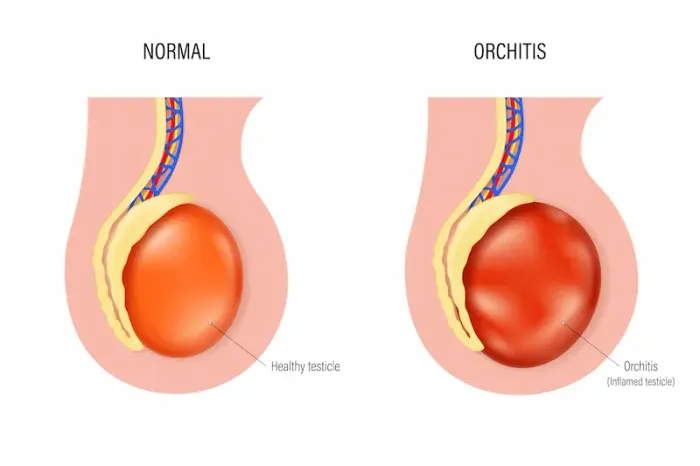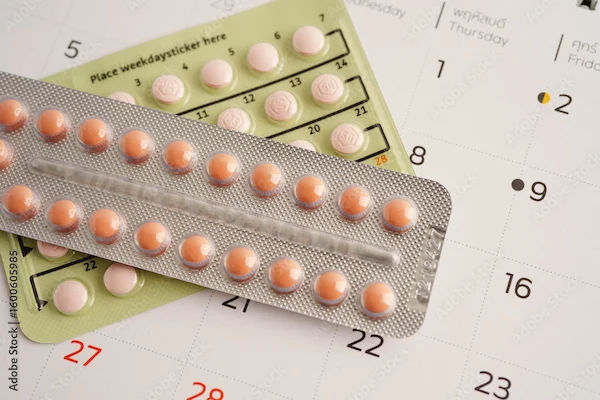Orchitis: Overview of Causes and Treatment
Orchitis is inflammation of one or both testicles, often caused by infections like mumps or STIs. Discover its symptoms, causes, risk factors, and the most effective treatment options for recovery.


Orchitis is a condition that affects the testicles, causing pain, swelling, and discomfort. While it can be distressing, understanding its causes, symptoms, and treatment options can help you manage it effectively. This article will guide you through everything you need to know about orchitis in simple, easy-to-understand terms.
What is Orchitis?
Orchitis is the inflammation (swelling) of one or both testicles. It can occur due to infections, most commonly from bacteria or viruses. While it can affect men of any age, it is more common in sexually active men and those with certain underlying health conditions.
Symptoms of Orchitis
If you have orchitis, you may experience:
• Pain and tenderness in one or both testicles
• Swelling in the affected area
• Fever and chills
• Nausea or vomiting (in some cases)
• Discharge from the penis (if caused by a sexually transmitted infection)
These symptoms can develop suddenly or gradually, depending on the cause.
What Causes Orchitis?
Orchitis can be caused by:
1. Bacterial Infections
• Sexually transmitted infections (STIs) like gonorrhea or chlamydia can lead to orchitis, especially in young, sexually active men.
• Urinary tract infections (UTIs) or prostate infections can also spread to the testicles.
2. Viral Infections
• Mumps virus is a common cause, especially in boys and young men who haven’t been vaccinated.
• Other viral infections like the flu can sometimes trigger orchitis.
3. Other Causes
• Trauma or injury to the testicles
• Autoimmune conditions (rarely)
Consult Top Specialists To Know More
How Does Orchitis Affect Health?
If left untreated, orchitis can lead to complications such as:
• Chronic pain in the testicles
• Infertility (if both testicles are severely affected)
• Abscess formation (a collection of pus)
• Shrinkage (atrophy) of the testicle due to prolonged inflammation
However, with proper treatment, most men recover fully without long-term problems.
Diagnosis of Orchitis
If you experience symptoms of orchitis, a doctor may perform:
• Physical examination to check for swelling and tenderness
• Urine tests to detect infections
• Blood tests to look for signs of infection
• Ultrasound to rule out other conditions like testicular torsion (a medical emergency)
Treatment for Orchitis
The treatment depends on the cause:
1. Bacterial Orchitis
• Antibiotics are prescribed if the infection is bacterial.
• Pain relievers (like ibuprofen) and warm compresses can help reduce discomfort.
• Rest and scrotal support (wearing supportive underwear) can ease swelling.
2. Viral Orchitis
• Since viruses don’t respond to antibiotics, treatment focuses on pain relief and rest.
• Staying hydrated and using cold packs may help.
3. Home Care Tips
• Avoid strenuous activities until symptoms improve.
• Elevate the scrotum with a rolled towel while lying down.
• Stay hydrated and maintain good hygiene.
Preventing Orchitis
You can lower your risk by:
• Getting vaccinated against mumps (MMR vaccine).
• Practising safe sex (using condoms) to prevent STIs.
• Treating UTIs promptly to avoid spreading infection.
When to See a Doctor?
Seek medical help if you notice:
• Severe testicular pain (could be testicular torsion, which is an emergency)
• High fever or worsening symptoms
• Blood in urine or abnormal discharge
Early treatment can prevent complications and speed up recovery.
Need Help? Consult a Specialist!
If you suspect orchitis or have persistent symptoms, don’t hesitate to seek medical advice. You can book a consultation with a urologist through Apollo 24|7 for expert guidance and treatment.
Conclusion
Orchitis can be painful and worrying, but with the right care, most men recover fully. Recognising symptoms early, following treatment, and taking preventive steps can help you stay healthy. If you have concerns, reach out to a healthcare provider for support.
Consult Top Specialists
Consult Top Specialists To Know More
Dr S K Singhanina
Urologist
25 Years • MBBS/MS/DNB AND MCH UROLOGY
Guwahati
Apollo Clinic Guwahati, Assam, Guwahati

Dr. Sandeep Maheswara Reddy Kallam
Urologist
6 Years • MBBS, MS (General Surgery), M Ch (Genito-Urinary Surgery), Post Doctoral Fellowship in Uro-Surgical Oncology
Visakhapatnam
Dr. SANDEEP MAHESWARA REDDY K _- best Urologist in visakhapatnam, Visakhapatnam
(250+ Patients)

Dr. Pavan Kumar S K
Urologist
11 Years • MBBS, MS , Mch( Urology) DNB (Urology)
Bengaluru
Apollo Clinic, JP nagar, Bengaluru

Dr. Sudhakar G V
Urologist
25 Years • MBBS, MS(Gen.Surgery), DNB Urology
Bengaluru
Apollo Clinic, JP nagar, Bengaluru

Dr. Prabir Basu
Urologist
19 Years • MBBS, MS General Surgery, DNB Genito-Urinary Surgery
Jodhpur Park
Dr. Prabir Basu urology clinic, Jodhpur Park
(150+ Patients)
Consult Top Specialists
Dr S K Singhanina
Urologist
25 Years • MBBS/MS/DNB AND MCH UROLOGY
Guwahati
Apollo Clinic Guwahati, Assam, Guwahati

Dr. Sandeep Maheswara Reddy Kallam
Urologist
6 Years • MBBS, MS (General Surgery), M Ch (Genito-Urinary Surgery), Post Doctoral Fellowship in Uro-Surgical Oncology
Visakhapatnam
Dr. SANDEEP MAHESWARA REDDY K _- best Urologist in visakhapatnam, Visakhapatnam
(250+ Patients)

Dr. Pavan Kumar S K
Urologist
11 Years • MBBS, MS , Mch( Urology) DNB (Urology)
Bengaluru
Apollo Clinic, JP nagar, Bengaluru

Dr. Sudhakar G V
Urologist
25 Years • MBBS, MS(Gen.Surgery), DNB Urology
Bengaluru
Apollo Clinic, JP nagar, Bengaluru

Dr. Prabir Basu
Urologist
19 Years • MBBS, MS General Surgery, DNB Genito-Urinary Surgery
Jodhpur Park
Dr. Prabir Basu urology clinic, Jodhpur Park
(150+ Patients)

.webp)


